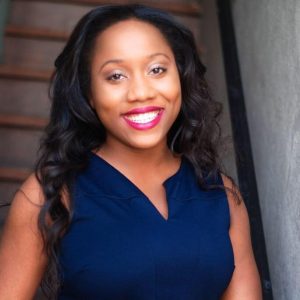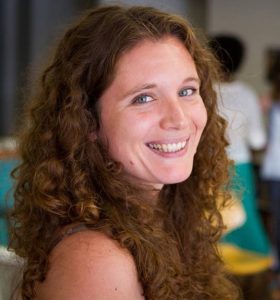The Mississippi Delta is often labeled as a region with “the highest rates of everything bad and lowest of everything good.” But young leaders who are returning home to the Delta — or relocating from beyond the region — have a different vision. And education is the way to achieve it, they say. This is the first installment of a three-part series on young Delta leaders, produced by Delta resident Timothy Lampkin with Winfield Ezell, and Sean Cokes.
EDITOR’S NOTE: This is a republication of a series of articles we originally published in December 2016.
First in a three-part series.
Read the second and thirds parts.
Teresa Jones and Anja Thiessen have very different backgrounds, but they both see education as a way to uproot entrenched poverty in the Mississippi Delta.
Jones is from a small, unincorporated community about 25 miles east of the Mississippi River. Thiessen was raised near a different river, the Rhine, which flows past her hometown of Bensheim, Germany.
Both women have helped build new education programs that focus on Delta youth. Jones’ efforts have focused on her hometown of Holly Bluff, located about 20 miles west of Yazoo City between the Delta National Forest and the Panther Swamp Wildlife Refuge. Thiessen is located in Coahoma County, which is about 70 miles south of Memphis, Tennessee, and part of the Clarksdale Micropolitan Statistical Area.
TERESA JONES
(This interview was completed this summer while Teresa was teaching. She is currently on an internship in Washington, D.C.)
How did you come to be an educator in Holly Bluff, Mississippi?
I was born and raised in the Holly Bluff, Mississippi, and I went to school at South Delta high school. I, then, went to Ole’ Miss and I received a legislative internship with Congressman Bennie Thompson[2nd District, Mississippi].. I secured a position at a contracting firm on Capitol Hill shortly thereafter. After a year and a half, I longed to be back home; however, it’s not because I necessarily missed home. There’s not exactly a lot of activity going on in the Delta. It’s mainly because I recognized a need there. There are a lot of Mississippians in D.C., but I recognized that one of the greatest assets in Washington, DC, is having a strong network. I realized back at my home town there isn’t really a big network of young people — or a means for getting ahead — because everyone leaves and they don’t look back.
Well, The counselor at my alma mater high school told me that their English teacher quit in the middle of school year. The graduating class in May did not have an English teacher. So I got a one-year teaching license and now I’m teaching at beside people that taught me.
Tell us about the work you do in the Mississippi Delta.
The Mississippi Delta has some of the highest rates of everything bad and lowest of everything good. For young girls, there aren’t many options other than the military after high school — although that can be a great option for many young girls. But I wanted to inspire and expose our you girls to something more, so I started a mentoring program for young girls called Girls Achieving, Leading and Succeeding (GALS). I started this program for young girls to create a network of young people to and through college, so that they could come back and mentor here as well.

Even though I was 1,000 miles away, I organized weekly meetings, field trips, and special events. I’m able to give back by teaching and grow my mentoring program.
While teaching English and literature, I’m also helping them do their resumes and college prep. It’s challenging because I don’t have a degree in education, but it’s exciting because I grew up in a household with an educator — my mom. I also run the mentorship program full time. I finished out the year with 100% of my students graduating high school and 100% of them getting accepted into college with some financial aid.
What is the greatest challenge you see facing the region?
One of the great challenges here is a lack of vision from young people. I could talk about the brain drain specifically, but the root of it all is the lack of vision. They’re leaving because we don’t have a vision for the community.
I see a lot of people saying things, having ideas, coming to places like Washington, D.C., and then refusing to come back home and run for office.
We also need to work on helping people gain financial literacy — learning to save and to invest.
What’s the great opportunity for change here in the Delta?
The greatest opportunity for the Mississippi Delta is the fact there is this immense possibility for growth. Literally, anything goes. You can start a deli. You can start a salad bar to promote healthy eating and use local farms to buy and ship produce. There is so much opportunity for growth … There is a huge opportunity to start-up enterprises locally.
How are you taking that opportunity in your work, and what are the potentials for success you see?
My mentoring program’s mission is to positively impact young girls through high school and college. My dream is that this new network of successful women will continue to come back and cultivate young leaders, young professionals. If we can promote this network of young women, we can end this cycle of poverty — with these young women, at least. And maybe at every at-risk school in the state. We’re taking these young women — many of whom don’t have means – and I’m showing them that I’m investing in and helping them so they can come back and help others. We’re doing workshops with the girls on financial literacy, professional development, and academic achievement.
ANJA THIESSEN
How did you come to be an educator in Clarksdale, Mississippi?
I’ve been in Clarksdale, Misssissippi, for the last 5 years now. I came here for the first time in 2001 on a Habitat [for Humanity] trip. I was still in high school in Germany. I wanted to take a gap year because I wanted to do something meaningful, so I decided to spend it in Clarksdale. I worked on two after school programs and decided that this was the place I wanted to be, to invest in. But, I decided I needed to get skills before I came here, so I finished college.
I started Spring Initiative with Bianca Zaharescu in 2011. We just finished our fifth year.
Tell us about the work you do in the Mississippi Delta.
Our mission is to empower youth and families in the North Mississippi Delta to thrive and transform their community. So, what we do is educational interventions, holistic support, and we provide long-term relationships. We work with kids who — when they start with Spring — they’re not living out their potential. They are struggling in school, behaviorally, or they need extra support. The goal is ensuring every child has the potential to have a life that is fulfilled and happy and healthy and productive. So what we try to do is to ignite that desire.

A lot of kids have so much to deal with that is not school related it’s hard to make that decision to engage with school. But if you do engage with the school piece, it makes such a difference. But, we’re not holding up money, we’re holding up a goal of choice: like, if you’re excited about building things, you can go study architecture. You can say: ‘break the cycle of poverty,’ but we are talking about giving kids the opportunity to live out those fulfilled lives.
What is the greatest challenge you see facing the region?
The greatest challenge facing our area is a totally divided education system in which nobody — black or white, rich or poor — is getting the kind of education they deserve. Resources are spread so thin between all the different school districts, public and private, in this community.
In Coahoma County the childhood poverty rate is over 50 percent. There are not many paths to look at that seem inspiring. A lot of people who graduate high school and go to college never come back.
There are lots of different challenges in Clarkdale and education is one of the things that can be used to break the cycle of generational poverty. But the educational system in our community is really struggling. There are amazing teachers and administrators who try really hard and face incredible challenges. But unfortunately, with all the divisions, the lack of resources, some really burned out actors, a lot of trauma and obstacles all around, we as a community are not able to serve our children the way they deserve.
There are many different projects that people have been throwing money at with little result. That means we need to try new things. We’re failing generation after generation of students who are not prepared to lead a happy and healthy, successful life.
What’s the great opportunity for change here in the Delta?
The young people are the absolute biggest opportunity for the Delta. We get to work with kids that people have written off every day. They are the brightest, funniest, most creative young minds you’ve ever met. If people get exposed to the different ideas, they will set the world on fire. But there is just not that investment. I think the young people in Clarksdale are what can give you hope. We get to see that at Spring.
How are you taking that opportunity in your work, and what is the potential for success you see?
At this point, Spring is able to touch one person at a time. Right now we serve 45 students every day and reach 100 families in intensive parenting classes. Right now we’re not doing these huge things to change the community, but Spring is transforming futures.
I really want to eventually see a critical mass of people who are invested in changing things in the schools. Investing in active after school and extra-curriculars. There are not just enough things to do for the kids. I think eventually there will be that critical mass and eventually there will be a tipping point.
Right now we see a lot of transformation on the personal level, and eventually I would like to see change happening on the community level.
This article and the accompanying video were produced by Timothy Lampkin of Lampkin Consulting Group LLC and Winfield Ezell and Sean Cokes of Obsidian Creative Studios, with support from the Mississippi Delta National Heritage Area.
This article was originally published on The Daily Yonder.



